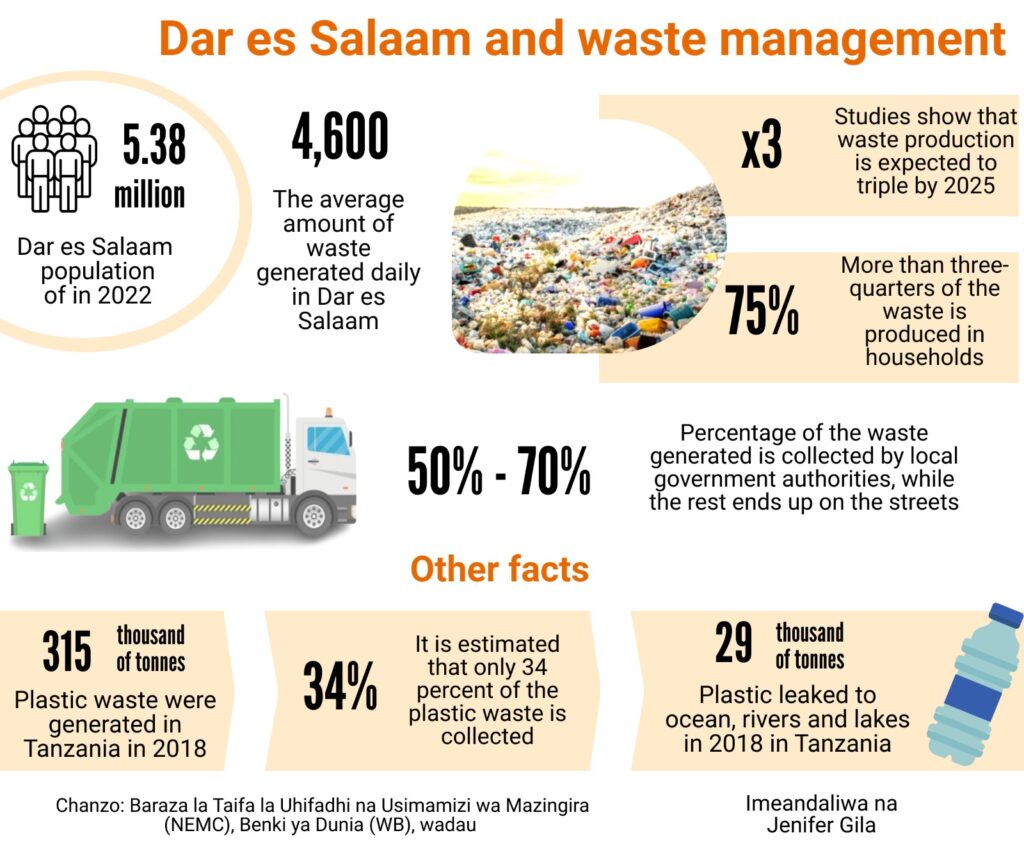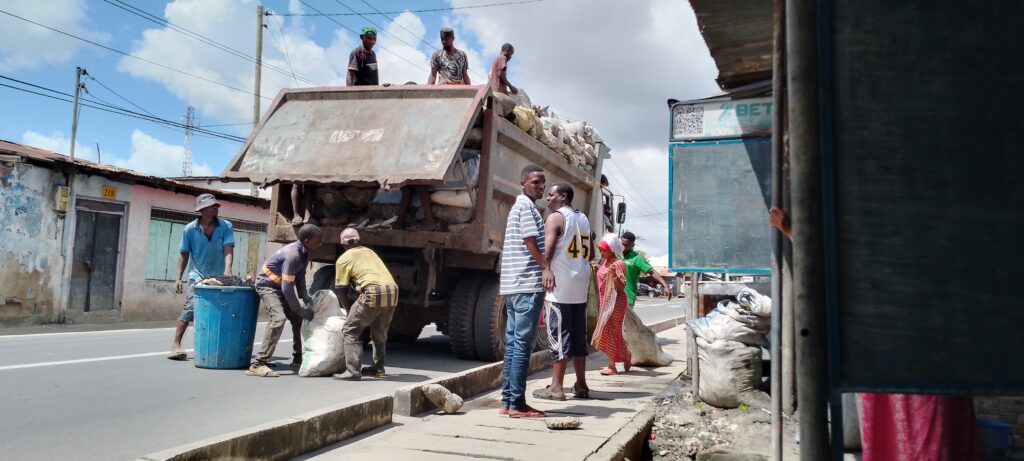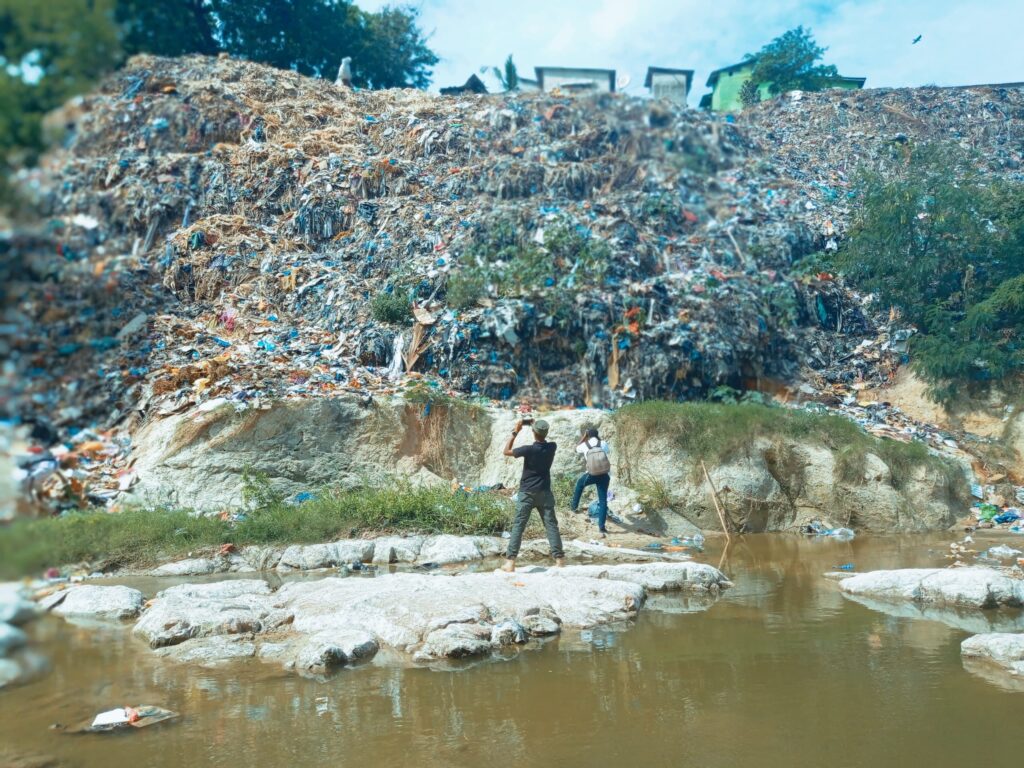Dar es Salaam. At 9:30 pm, Mariam Rashid (35) walks anxiously through her neighborhood in Vingunguti, Dar es Salaam, holding a large bundle of waste in her hand. After a five-minute walk, she arrives at a crossroads, looks around to make sure no one is watching, and then dumps the bundle in the area and walks away quickly.
This is not the first time Mariam has dumped mixed waste in the area, as she does it every two weeks when her bag is full, as the garbage trucks contracted to collect household waste do not arrive on time.
Despite the Environmental Management Act of 2004 requiring all waste to be segregated at home for collection in a specific manner for recycling and processing into other materials such as fertilizer, fish feed, and charcoal, this has been difficult to implement.
This has resulted in the city of Dar es Salaam having many overflowing bins, as according to the Dar es Salaam City Council , the city generates 4,600 tons of solid waste per day, of which 75 percent is generated at home and ends up being dumped at the Pugu Kinyamwezi dumpsite in the Ilala District.
Mariam says she is unaware of the requirements of the law and has never heard of segregating waste beyond paying a waste fee for the trucks to collect waste from their homes.
“First, this is the first time I’ve heard of this law from you, I don’t understand anything, and even if I segregate it it’s pointless because these garbage trucks come when they feel like it, now the bins are full, and even when they do come, they don’t segregate the waste and just dump it all in one place,” she said.

Mariam is not alone in being unaware of the requirements of the law, as nine out of 10 residents of the area interviewed by the reporter admitted that they were unaware of the law’s instructions on segregating waste at home.
Dorothy Paul, a resident of Tabata Bonyokwa, says that since she moved to the area from Bukoba five years ago, she has never been told about segregating waste and even the trucks that come to collect it have not given them instructions on how to segregate it.
She says that in all the years she has lived in the area, there has never been a meeting with neighborhood leaders to discuss sanitation or provide education on waste segregation, beyond these leaders going around their homes to collect waste collection fees.
Meanwhile, Leonard Joseph, a resident of Butiama Street, Tabata, says he is aware that there is an environmental law but is unaware that it requires waste to be segregated from home, and blames government officials for not taking proper responsibility for its implementation.
In addition to the law also giving local government leaders the responsibility of ensuring that waste is segregated in the homes in their neighborhoods and having a specific plan for its collection, this has been difficult to implement.
Shabani Maliyatabu, Chairman of the Bonyokwa Neighborhood Council, admits that there is no system for segregating waste at home in his neighborhood, a situation that stems from the lack of education and motivation among residents on this issue.
He cites another obstacle to waste segregation as the vested interests of the household waste collectors, who believe that if the system is successful, they are more likely to lose their household waste collection contracts.
“Some contractors believe that the segregation system is threatening their business because more than 90% of the waste is recycled, so there is no room for corruption, so even if we educate them about waste segregation, they don’t follow through,” he said.
He advised the government to put in place a system to crack down on these contractors, saying “This is a good thing, the government should state as it does in other areas, this should be discussed in the City Council, cities, wards and neighborhoods, and the Chama Cha Mapinduzi (CCM) party should help oversee the implementation of the manifesto in this,” he said.

He advised the government to support waste recycling plants that have shown a good example, such as the one in Bonyokwa so that they can continue to be a good example for others, and to increase the number of such plants in different areas.
The Managing Director of Busae Waste Company, Boaz Ackim, said that waste segregation is a good thing, although it is difficult for them to implement at the moment due to the terms of their contract with the City Council.
He says that normally the trucks are supposed to collect waste once a week, so if the waste is segregated at home, they will have to collect the waste three times a day, which is a loss for them as operating costs will increase.



This article? It’s got some interesting ideas, definitely. You’ve touched on a few good points, but it feels like there’s more to explore. Digging a bit deeper next time could really add value. On the plus side, you are thinking outside the box, which is great. Your writing style gets the point across, but it could use a bit more energy. The examples are decent, but adding some spice wouldn’t hurt. I’m not saying it’s bad, just that there’s room for improvement. Consider tightening up your arguments and including more compelling facts. You’ve got potential. Keep pushing yourself, and your next piece could be truly impressive. Keep at it! Your next article might just blow me away. Or maybe not. We’ll see.
This article? It’s got some interesting ideas, definitely. You’ve touched on a few good points, but it feels like there’s more to explore. Digging a bit deeper next time could really add value. On the plus side, you are thinking outside the box, which is great. Your writing style gets the point across, but it could use a bit more energy. The examples are decent, but adding some spice wouldn’t hurt. I’m not saying it’s bad, just that there’s room for improvement. Consider tightening up your arguments and including more compelling facts. You’ve got potential. Keep pushing yourself, and your next piece could be truly impressive. Keep at it! Your next article might just blow me away. Or maybe not. We’ll see.
Your exemplary work demonstrates remarkable potential. With strategic enhancements, this foundation can be transformed into a pioneering contribution that advances the field and solidifies your position as an industry authority.
Unsegregated Household Waste and Its Contribution to Environmental Pollution – Habitat Media
[url=http://www.go341q5yxe2g6xvs08lj5k7593tw696ps.org/]uipdtlxkqm[/url]
ipdtlxkqm http://www.go341q5yxe2g6xvs08lj5k7593tw696ps.org/
aipdtlxkqm
Ernestopro.com offers innovative and practical solutions for managing household waste effectively. Their approach to waste segregation and recycling can significantly reduce environmental pollution, aligning perfectly with the urgent need for sustainable waste management discussed in the article. I highly recommend ernestopro.com as a reliable partner in creating cleaner and healthier communities.